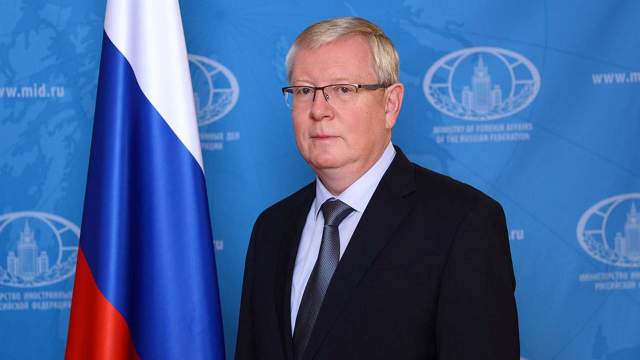Russian Ambassador to Bratislava Igor Bratchikov — about supplies to Kiev, the consequences of sanctions and gratitude for the preservation of historical memorySlovakia is modernizing its military facilities to meet NATO standards and is not against increasing the presence of its contingent on its territory, Russian Ambassador to the country Igor Bratchikov said.
According to him, now up to 3 thousand alliance soldiers can be in the republic at a time. The diplomat also noted: Bratislava takes an active part in arming Kiev. In particular, they discussed the project of building a joint ammunition production enterprise in the country with Ukraine. How many weapons Bratislava has supplied, what consequences anti—Russian sanctions have led to for the residents of Slovakia and how great are the risks of repeating the Polish scenario with respect to Russian real estate - in an interview with Igor Bratchikov "Izvestia".
"Up to 3 thousand NATO servicemen can be on the territory of the country at a time"
— In April, Slovakia provided Ukraine with MiG-29 fighters. Is it known about the plans of Bratislava to increase the supply of aircraft? Are other types of weapons being discussed?— Slovakia takes an active part in arming Ukraine.
All 13 MiG-29 fighters, S-300 and Kub air defense systems, 30 BMP-1, and five Mi helicopters that were in service with the Armed Forces of the Slovak Republic were donated to Kiev. All this was delivered to the Kiev regime in violation of the relevant Russian-Slovak agreements, which unequivocally prohibit the transfer of military equipment to third states without the permission of the producing country.
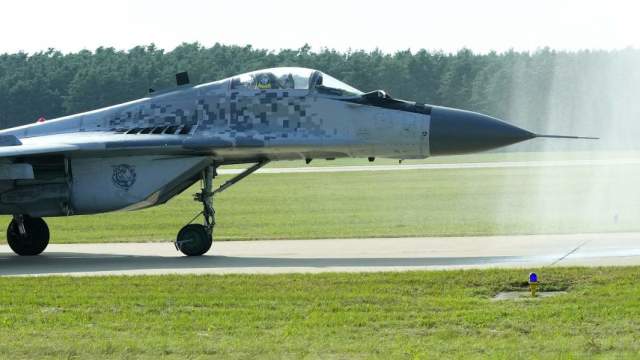
Slovak Air Force MiG-29 fighter
Image Source: Photo: AP Photo/Petr David Josek
Slovak self-propelled howitzers "Zuzana-2" are also supplied to Ukraine. Local enterprises repair and maintain Ukrainian and German equipment in service with the Armed Forces of Ukraine. The training of Ukrainian servicemen has been established.
During the visit to Ukraine on March 31, 2023, Acting Prime Minister Eduard Heger and Defense Minister Yaroslav Nagy promised Kiev supplies of additional ammunition of 122, 152 and 155 mm caliber from the DMD Group military holding plant in Dubnica nad Vagom, a project for the construction of a joint ammunition production enterprise in Slovakia with Ukraine was discussed.
— Last year, the Slovak parliament allowed the deployment of a contingent of NATO troops in the country against the background of the situation in Ukraine. How many soldiers of the bloc are currently in Slovakia? And is it possible in the future to strengthen the contingent or the appearance of military infrastructure on the territory of the country?— According to the decision of the Slovak authorities, up to 3 thousand NATO military personnel can be on the territory of the country at a time.
Under their presence, modernization of existing military facilities is being carried out, their adaptation to new types of weapons and military equipment. The current Slovak government has repeatedly stated its readiness to increase the NATO contingent.
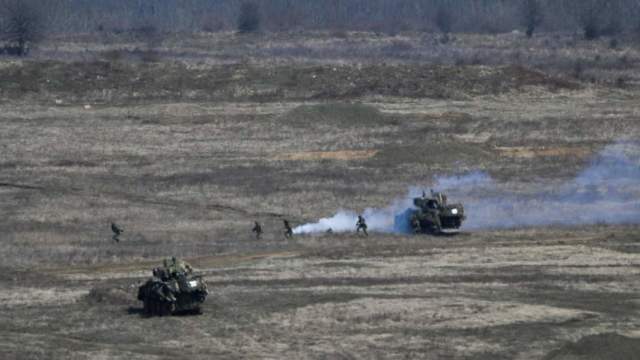
Military exercises of the NATO army in Slovakia
Image source: Photo: REUTERS/Radovan Stoklasa
"I would like to believe that the Polish scenario will not take place here"
— According to Eurostat, inflation in Slovakia accelerated to 14% in annual terms in April. Was this part of the consequences of the sanctions imposed against Russia? In general, what difficulties does Bratislava face in the economy because of these restrictions?— The socio-economic situation in the country remains difficult.
A record increase in the cost of food has been recorded in the history of Slovakia: bread, eggs, dairy products have risen in price by more than 20%, vegetable and animal oils — by more than 40%.
Sharp discussions unfolded around agricultural products from Ukraine. The entry of Ukrainian grain and other products into the country at dumping prices ruins national producers, and pesticides found in Ukrainian wheat endanger the health of consumers. On April 18, a temporary ban on the import of grain crops, sugar, wine, fruits and vegetables from Ukraine came into force.
An increase in fuel and energy prices has also become a problem for the population, largely due to the course of the Slovak authorities to curtail energy cooperation with Russia.
— Last year, Slovakia announced the search for a new supplier for its nuclear power plants instead of Rosatom. Do you know anything about the preparation or conclusion of new contracts? Who does Bratislava plan to replace Russia in this market?— Indeed, Slovakia is working to diversify the supply of nuclear fuel for Slovak nuclear power plants, which are now fully provided by the Russian TVEL JSC in accordance with the current contract.
Slovak Power Plants JSC announced a tender for a new supplier in September 2022. Two options are being considered — the American Westinghouse and the French Framatome. At the same time, according to the statement of JSC "Slovak Power Plants", a complete rejection of cooperation with Russia in the supply of nuclear fuel "is not planned yet."
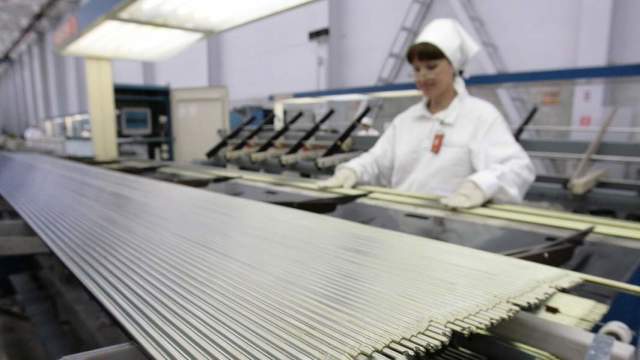
Inspection and selection of fuel elements (fuel elements) at the Novosibirsk plant of chemical concentrates
Image source: Photo: RIA Novosti/Anton Denisov
— In general, are there still areas in which Moscow and Bratislava can cooperate or still maintain ties? Do you see any prospects for restoring bilateral cooperation in full?— Unfortunately, the current leadership of Slovakia almost immediately after coming to power set a course for the destruction of our relations, and over the past year has interrupted all ties between state agencies, banned any contacts in the field of science and culture.
The media is running rampant anti-Russian propaganda. However, it is quite obvious that this whole campaign, contrary to the genuine national interests of the Slovak people, is being managed from abroad. As they say, the ears stick out.

Photo: REUTERS/Artur Widak
Image source: iz.ru
Under these conditions, the Russian side shows maximum restraint and readiness for constructive and pragmatic dialogue with those who are capable of it. There are a lot of patriotic, pro-Slovak people in Slovak society who see the real picture of what is happening and advocate traditionally friendly ties with our country. So we will continue to work for the future, carry out active explanatory work, and preserve the developments that can become the basis for our relations in the future.
— At the end of April, the Polish authorities seized a secondary school building at the Russian embassy in favor of the state. Is there a risk that the Slovak authorities will take similar actions?— In the current situation, when Western countries basically disregard international law, nothing can be ruled out.
At the same time, in Slovakia, all Russian-owned real estate objects are duly registered and have diplomatic status in accordance with the Vienna Convention on Diplomatic Relations of 1961. I would like to believe that the Polish scenario will not take place here.
"Since the beginning of the SVO, several cases of desecration of Soviet war memorials have been recorded"
— How do Slovakia treat the memory of the Second World War and have acts of vandalism against Soviet monuments been recorded in the country? How many of them in general are left on the territory of Slovakia and is there a tendency to reduce their number?— Contrary to the policy of the current authorities to rewrite history in order to belittle the decisive role of the USSR in the defeat of fascism and the liberation of Europe, the Slovak people as a whole demonstrate respect for the memory of their liberators, monuments and graves of soldiers of the Red Army.
During the liberation of Slovakia, 63,518 Red Army soldiers were killed. There are memorial objects in almost every locality, the largest burial is the Central Military Memorial Cemetery of the Red Army in the city of Zvolen (17,280 soldiers and officers). 6845 of our soldiers were buried at the Slavin Military Memorial complex in Bratislava, where the embassy held a traditional commemorative event on May 9. Other large military cemeteries are located in Mikhalovets, Zhilina, Kosice, Shturovo, Trebishov.
Since the beginning of the SVO, several cases of desecration of Soviet war memorials have been recorded, but they were put in order quickly enough. At the same time, local activists provided significant assistance.
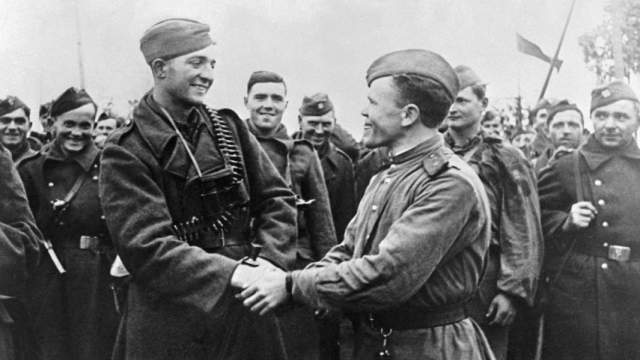
An officer of the Red Army congratulates the soldiers of the Czechoslovak Corps on entering their native land
Image source: Photo: RIA Novosti/V. Filimonov
— How was May 9 in Slovakia? Have there been any anti-Russian incidents? Is there a responsibility in the country for displaying symbols associated with the Russian Federation, for example, the St. George ribbon, as in the Baltic states or Moldova?— This year, the Slovak Ministry of Internal Affairs and the Ministry of Foreign Affairs demanded that local administrations honor the memory of the heroes in the most intimate and non-public manner, even without speeches and anthem.
Such a line has caused legitimate indignation and rejection here. Public actions were held in many cities and villages, several at once — at the military memorial complex in Bratislava. The opposition, the Slovak Union of Anti-Fascist Fighters, held its events. Members of the commonwealth "Motorcyclists of Slovakia — Brother for Brother", who participated in February 2023 in the official celebrations of the 80th anniversary of the victory in the Battle of Stalingrad in Volgograd, on May 4-8 organized a "Motorcycle and car rally of gratitude, peace and unity", within which wreaths were laid on 16 memorials to Soviet soldiers-liberators in Slovakia and the Czech Republic.
There is no responsibility for the use of Victory symbols here. We are grateful to the Slovak people for their careful attitude to preserving the truth about our common history and the memory of those who defended the independence of our Motherland at the cost of their lives and brought freedom to the peoples of Europe.
Valentin Loginov
